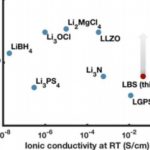The high and escalating demand for the lithium-ion batteries that dominate the market is driving the search for alternatives. Ideally, they will be made from inexpensive, abundant materials. David Chandler at MIT describes research there into a design that uses aluminium and sulphur as its two electrode materials, with a molten salt electrolyte in-between. The results point at batteries that have a projected cost per cell of about one-sixth that … [Read more...]
Research into solid electrolytes to improve performance of lithium-ion batteries
If the limits of lithium-ion battery performance are indeed being reached, one way forward is to extend those limits with new materials. Mark Shwartz at Stanford University describes their research into solid electrolytes, which promise to be more energy dense than the standard liquid form. To identify the best compounds, artificial intelligence and machine learning were used rather than the usual and much lengthier trial-and-error experimental … [Read more...]
Lithium-Sulphur batteries: cheaper, greener, hold more energy
The rapid expansion of electric power across the world is putting a strain on battery production. The standard lithium-ion battery depends on minerals and metals in limited supply, so alternatives are needed urgently. Mahdokht Shaibani at Monash University describes the work of her team on developing lithium-sulphur batteries. There are many advantages, not least the abundance of sulphur, the 16th most common element on Earth. Added to that, … [Read more...]




